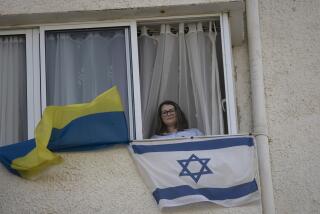Chechens With 2 Homelands Find Neither Welcoming
- Share via
KAINAR, Kazakhstan — Abumuslim Israpilov places his hand on the cold tombstone rising from the Kazakh steppes, praying briefly over his grandmother’s body. It is a moment soaked with irony.
Israpilov’s grandmother is buried here, in Central Asia, and not in her native Chechnya, because nearly 60 years ago Stalin the dictator deported the entire Chechen population 1,500 miles east to Kazakhstan.
Now her grandson has moved here because life in Chechnya has become so awful that impoverished Kazakhstan, symbol of perhaps the greatest injustice inflicted on the Chechens, has come to seem comfortable by comparison.
Israpilov was an airport technician in Grozny, the Chechen capital, until the fighting and bombing became too much for him. In June 2000, he became one of 12,000 Chechens who have sought refuge in their forefathers’ land of exile during the eight years that war has ravaged their homeland in the Caucasus Mountains.
The cemetery of crescent-crowned Muslim graves is in Kainar, a village 28 miles west of Kazakhstan’s commercial capital, Almaty. Kainar’s small cement houses, built by Stalin’s deported Chechens, have become home to their uprooted descendants.
Now more Chechens are appealing to Kazakhstan for sanctuary away from the misery of refugee camps. Unwelcome elsewhere, they see this country as one of their last options, a Muslim nation that once gave them refuge, education and jobs.
“It’s like a second motherland for us,” Israpilov said.
But the Chechens’ plea to be recognized as refugees presents the Kazakhstan government with a quandary. It wants good relations with the Kremlin, and refugee status might be read as questioning Russian President Vladimir Putin’s claim that Chechnya is returning to normal and that the refugees can go home.
It was Feb. 23, 1944, when, on Stalin’s orders, all Chechens were deported to Kazakhstan -- half a million people herded into freezing railroad cars bound for the steppes. Stalin feared that the Chechens would join the advancing German army and turn against the Soviet Union, as they had three other times after the 1917 revolution. Actually, thousands of Chechens served in the Soviet army during World War II, and some were decorated for valor.
Most of the Chechens were sent to the icy, inhospitable north of Kazakhstan, and in the next 13 years until they were allowed to return home, half of them died from cold, disease and hunger, said Akhmet Muradov, chairman of a Chechen cultural association in Kazakhstan.
A few stayed here and today are Kazakh citizens, numbering about 32,000 -- a tiny minority in the vast post-Soviet republic of 17 million. But the newcomers are Russian citizens and not officially recognized as refugees. They complain of discrimination in residency permits and jobs, especially since the Moscow theater attack by Chechen rebels in October that left 129 hostages dead.
More than 10,500 Chechen refugees signed a letter in November appealing to Kazakh President Nursultan Nazarbayev for refuge, but he refused, calling it an internal Russian matter.
Still, Muradov warns that thousands of Chechens crowded into refugee camps in Ingushetia, the region in Russia neighboring Chechnya, will come here to avoid a fourth winter in tents, surrounded by Russian troops.
“They ran away from Chechnya to Ingushetia, but it’s almost the same situation as in Chechnya now,” Muradov said. “In Chechnya, the situation is even worse than it was in 1944 during the war. People are looking for a place where they can survive.”
The U.N. refugee agency has won Kazakhstan’s agreement to grant de facto refugee status to Chechens who have already fled here and let them work. The agency is also pushing Kazakhstan to prolong residency permits from three months to six months with a possible six-month extension.
But the Chechens have little money -- Israpilov survives on $6 a month in handouts from relief agencies -- and refugees who can’t afford to bribe the corrupt bureaucracy don’t get registered. During a recent trip to northern Kazakhstan, U.N. officials said they had heard reports of at least 30 deportations and feared that was only a small part of the problem.
Kazakh officials are also stepping up screening practices.
Lyoma Zaurbekov, 51, a former electrician at the Grozny circus who came to Kazakhstan in May 2000 with his wife and two sons, said that when he recently tried to renew his registration, he was videotaped mug-shot style, told to speak so that his voice would be on record, then denied registration. He said the officials asked him: “When are you getting ready to go home?”
Taisiya Khildkhoroyeva, 37, who had a miscarriage of twins while hiding in a basement during an air raid on Grozny, said she went back to Chechnya this summer to see what had changed. She found her university and apartment block in rubble.
“If I had somewhere to go, I’d go, but I don’t know where,” she said, taking a break from a free hairdressing class for refugees in Almaty. “There’s nothing there.”
More to Read
Sign up for Essential California
The most important California stories and recommendations in your inbox every morning.
You may occasionally receive promotional content from the Los Angeles Times.













